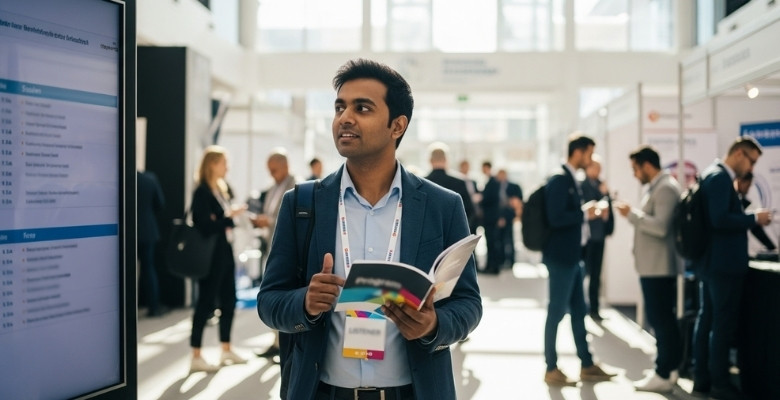Conferences bring people together to share knowledge, ideas, and experiences in one place. Not everyone joins to present their work or speak on stage, as many people attend mainly to learn. This often makes them wonder, who is a listener in a conference?
A listener in a conference is someone who attends sessions without presenting or publishing work. They sit in the audience to learn, observe, and take notes. Listeners are not part of the speaker panel or program committee. Their main role is to gain knowledge, follow discussions, and connect with others during breaks and networking times.
Do you want to know more about the role and value of listeners? If you are curious, keep reading because this article explains everything. You will find clear details about their purpose, responsibilities, access, and how they make conferences meaningful.
Who is a Listener in a Conference?
Before thinking about the role of a listener, it helps to remember that not everyone goes to a conference to present. Many people attend simply to learn and observe. Their presence helps keep sessions meaningful and alive. Now let’s explore who they are.

Role Meaning
A listener in a conference is someone who attends without presenting or speaking. They are there mainly to listen and gain knowledge. Listeners are not part of the speaker panel or organizing team. Their role is to be part of the audience and benefit from the talks given by experts. They help keep the event lively by being attentive and engaged.
Learning Focus
Listeners attend with the main goal of learning. They sit through the sessions, follow the talks, and understand different views on the topics being discussed. They get a chance to learn new ideas from experts. This makes them an important part of the event because without an audience, even the best talks would feel incomplete.
Participation Style
While they do not present, listeners can still join in certain parts of the conference. They may ask questions during Q&A sessions if the format allows. They can also take part in group activities or discussions. This way, they contribute to the flow of ideas even if they are not giving a formal talk themselves.
Note Taking
One of the main things listeners do is take notes. They write down important points shared by the speakers. These notes can later help them review what they learned and also share knowledge with others. Note-taking keeps them focused and engaged throughout the sessions.
Networking Breaks
Apart from sessions, listeners also use the breaks to meet new people. These casual talks during coffee breaks or meal times often help them build valuable connections, especially for international events like conferences in Canada where people from many different backgrounds come together and share experiences.
Audience Value
Having listeners makes the event complete. They form the larger group of the conference and give value to the speakers by being there to hear their work. Without listeners, a conference would just be a meeting of speakers without much impact. Their presence gives meaning to the event.
Flexibility
Listeners have more freedom compared to speakers. They can move from one session to another, pick which talks to attend, and adjust their schedule more easily. This flexibility allows them to make the most of the event by choosing sessions that match their interests.
Quiet Contribution
Even without speaking on stage, listeners make quiet but real contributions. Their questions, feedback, or even their attention add to the energy of the event. By showing interest and engaging in discussions, they help keep the sessions interactive and meaningful.
Personal Growth
For many listeners, attending a conference is a chance to grow. They learn new skills, hear about the latest updates in a field, and get motivated by meeting experts. This personal growth often stays with them long after the conference ends.
Listeners may not speak from the stage, but their importance is undeniable. They give value by being attentive and curious during sessions. They create a balance between the speakers and the audience. Without them, conferences would lose much of their true purpose.
How is a Listener Different From an Author, Presenter, or Delegate?
People can join in different ways depending on their role at conferences. Some come to share their work, while others attend mainly to listen and learn. The table below shows the main differences between a Listener, Author, Presenter, and Delegate.
| Aspect | Listener | Author | Presenter | Delegate |
| Main Role | Attends sessions to learn and network | Writes and submits a paper or article | Presents research on stage or in poster sessions | General participant, includes presenters and non-presenters |
| Contribution | No publication or presentation | Publishes academic or research work | Shares work with audience | May contribute or may just attend |
| Visibility | Passive attendee, not highlighted in the program | Listed in conference proceedings | Highlighted in the program as a speaker | Listed as an attendee, sometimes with group recognition |
| Goals | Gain knowledge, meet people, and follow the program | Share research findings with the community | Explain and discuss their work with others | Participate, network, and engage with sessions |
| Registration | Registered but not presenting or publishing | Registered and submits written work | Registered and delivers a talk/poster | Registered as an official attendee |
Every role has its own value. Authors and Presenters share their knowledge, Delegates may do both or simply attend, while Listeners focus on learning and making connections. Together, they all make the conference complete.
What Access Does a Listener Usually Get?
Listeners at conferences usually receive a lighter pass compared to speakers or VIPs. It is designed to provide access to the main parts of the program without including every extra feature. Here is what a listener pass often includes:
- Open sessions: This pass usually allows access to the main sessions where general discussions and talks happen, so listeners can learn from different speakers.
- Keynote speeches: Entry often includes keynote speeches by well-known or expert guests, which are usually the highlight of the event.
- Panel discussions: Listeners are often allowed to sit in panel discussions where multiple speakers share views and answer questions on specific topics.
- Coffee breaks: Short breaks with tea or coffee are included, giving a chance to relax and meet other attendees casually.
- Basic materials: Passes usually come with simple event items like a badge, a printed program, or an event guide for easy reference.
- Extra resources: Some events give access to recordings, presentation slides, or even a certificate of attendance, which can be helpful for later review.
- Special activities: Events may have add-on tickets for extra workshops, gala dinners, or private classes, which are not included in the basic listener pass.
A listener pass is designed to keep things simple. It gives access to the main content and basic facilities, while extra activities and special sessions are usually optional add-ons.
Who Should Choose a Listener Pass?
Attending a conference does not always mean standing on stage. Many people join only to observe, learn, and connect with others. Choosing the right pass can make the experience smoother. Let’s see who should consider getting a Listener pass.
Newcomers
People who are new to a field often feel more comfortable as listeners. They can attend sessions, understand how experts share ideas, and learn about trends. A Listener pass helps them settle in without the extra pressure of speaking. This makes their first conference experience much easier and enjoyable.
Students
Those still in school or college usually benefit from a Listener pass. It allows them to watch experts, take in useful knowledge, and prepare for future roles. They can spend time learning without worrying about making a presentation. This keeps their focus clear and their experience simple.
Early Professionals
Someone just starting their career may want to attend without pressure. A Listener pass works best for those who want to focus on learning, networking, and applying effective conference note-taking techniques to capture useful insights. It helps them grow with steady confidence and knowledge.
Managers
Leaders and managers often use Listener passes to watch trends in their industry. Instead of speaking, they spend time observing sessions and identifying useful practices. By doing this, they collect ideas that might help their teams. The pass helps them focus fully on learning and scouting.
Vendors
Business vendors sometimes attend as listeners before investing in larger roles. They learn about the audience, discover what people expect, and understand the type of products being shown. A Listener pass lets them prepare better for future booths or talks. This makes their decisions more informed and useful.
A Listener pass is ideal for people who want to learn without pressure. It fits newcomers, students, managers, and many professionals. It is a simple way to join without presenting. Choosing it makes conferences smoother and stress-free.
What Are the Common Limits for a Listener?
Listeners often join conferences to learn, connect, and explore new ideas without presenting their own work. While they enjoy access to key sessions and networking, their pass usually comes with certain limits. Understanding these boundaries helps set clear expectations before attending.
- Paper Submission: Listeners usually cannot submit their research papers for publication in the conference proceedings, as this option is reserved for authors.
- Presenter Certificate: A listener does not receive a presenter certificate because they are not presenting or speaking on stage during the event.
- Speaker Prep Calls: They are not included in special preparation calls or briefings that help presenters get ready for their talks.
- Closed Sessions: Some private or technical sessions may only be open to authors, reviewers, or invited speakers, making them unavailable to listeners.
- Q&A Priority: In many sessions, priority during question and answer time is given to speakers, reviewers, or participants with accepted papers.
- Event Recognition: Recognition in conference materials is usually limited, since only authors and presenters are highlighted in programs, abstracts, or booklets.
- Networking Roles: Listeners may take part in networking, but they do not play formal roles such as panelists, moderators, or workshop leaders.
Listeners help make the event balanced by showing interest in the program and supporting presenters. Even though their role is limited, they still gain useful knowledge, build networks, and enjoy the conference experience in their own way.
How Can Listeners Make the Most of a Conference?
Attending a conference as a listener can feel exciting and sometimes overwhelming because there are so many sessions, speakers, and chances to learn. To get the best value out of the event, it helps to know a few simple strategies. Keep reading to see how you can make the most of it.
Active Listening
Paying close attention to speakers is the first step to learning. Instead of just hearing words, try to connect the ideas with your own knowledge. This makes the talks easier to remember. Asking short questions during breaks can also strengthen your understanding.
Note Taking
One of the best ways is by understanding the importance of taking notes at a conference, since it helps turn listening into long-term learning. Jot down key points, examples, or even simple phrases. Later, reviewing your notes will help refresh ideas you may have missed.
Networking Time
Conferences bring people from different backgrounds, so take the chance to meet others. A short chat over coffee can lead to lasting connections. Exchanging contact details, sharing opinions, or simply introducing yourself makes the experience more meaningful and memorable.
Session Choices
Not every session will fit your interests. Look at the program early and pick the topics most useful for you. By planning ahead, you can spend your time wisely and avoid missing important discussions that match your personal or professional goals.
Post-Event Review
Learning doesn’t stop when the conference ends. Go through your notes, slides, or recordings if provided. Share what you learned with friends or colleagues. Taking time to review helps the knowledge stay fresh and useful in the future.
Making the most of a conference as a listener is not about attending every session, but about learning smartly, connecting with others, and reviewing later. With simple efforts, the event can turn into a meaningful learning experience.
FAQs About Who is a Listener in a Conference?
Conferences can feel busy and full of activities, and not everyone understands the role of a listener. Many people join simply to learn, observe, and be part of the audience. These questions and answers will help explain the listener’s role in detail.
Do Listeners Need to Prepare Before a Conference?
Yes, a listener should prepare before attending. They can read the program, check the topics, and know which sessions interest them the most. Preparation helps them follow discussions better and avoid feeling lost. It also makes their time at the event more valuable.
Can Listeners Interact With Speakers After a Session?
Most conferences allow listeners to talk with speakers during breaks or networking times. This gives them a chance to ask extra questions and share opinions. Such conversations often help listeners understand the topics in a deeper way. It also creates meaningful connections for future events.
Are Listeners Allowed to Join Workshops?
Some workshops are open to everyone, including listeners, while others may only be for presenters. If workshops are open, listeners can join and practice skills. This is a good chance for them to learn hands-on ideas directly from experts. It depends on the conference rules, so checking in advance is helpful.
How Do Listeners Benefit From Conference Recordings?
If recordings are offered, listeners can rewatch talks and understand points they missed earlier. Recordings give them a second chance to review complicated ideas. They can also pause, take notes, or replay important sections. This makes learning easier and longer lasting.
What Should Listeners Bring to a Conference?
It is useful for listeners to carry a notebook, a pen, and sometimes a laptop or tablet. They may also need their event badge or ID for entry. A small bag for event materials like guides or brochures can be helpful. Staying organized makes the experience smoother.
Can Listeners Ask Questions During Live Sessions?
Yes, in many cases they can, but the time may be limited. Listeners should keep their questions short and clear to get a chance. Asking thoughtful questions shows attention and respect for the speaker. It also adds value to the session for everyone present.
Do Listeners Get Any Official Proof of Attendance?
Some conferences give a certificate of attendance even to listeners. This document shows they were part of the event. It can be useful for personal records, school, or work. However, it is not the same as a presenter certificate.
How Do Listeners Stay Engaged During Long Sessions?
Listeners can stay focused by taking notes and paying attention to key points. Sitting near the front often helps reduce distractions. Taking small breaks during free time keeps the mind fresh. Staying active this way helps them enjoy the sessions more.
Can Listeners Share What They Learned With Others?
Yes, they can share notes, ideas, and discussions with friends or colleagues after the event. Sharing knowledge helps them remember the topics better. It also spreads useful information to people who could not attend. This makes the listener’s role even more meaningful.
Why Are Listeners Important for a Conference?
Listeners are the main audience, and without them, the event would feel empty. They give value to the speakers by paying attention and reacting. Their presence makes the sessions lively and worthwhile. A conference is complete only when listeners are part of it.
Conclusion
Listeners bring balance and life to conferences by being attentive, curious, and engaged. They may not present on stage, but they make every session meaningful with their presence and participation. Simply put, they are the audience, and that explains who is a listener in a conference.
When you attend as a listener, focus on choosing the right sessions, asking simple questions, and writing down helpful notes. Use breaks to connect with others, and review later for lasting impact. Wishing you the best for your next event.







